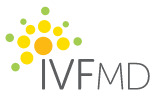If you know you want to have children in the future — or if you simply want to keep your reproductive options open — egg freezing can be an empowering way to preserve your fertility health. When considering egg freezing, it’s normal for individuals to ask questions like: “What does the egg freezing process entail?," "How do I assess my fertility health?" and "How much do fertility treatments cost?"
Dr. Palmerola walked us through key concerns potential patients may be debating when deciding if egg freezing is right for them.
How long does egg freezing take?
While egg freezing occurs during a specific time window, it’s a multi-step process with different moving parts.
“From the first visit to the day of egg freezing, this process can be as short as 6-8 weeks,” explains Dr. Palmerola. “We start by testing (bloodwork and ultrasound) to evaluate hormones, egg counts, and ovary function. Some of this testing is best done at the beginning of your menses, and other lab tests can be done at any time.”
The fertility health testing will help your supporting clinician better understand your hormone levels and ovarian reserve. Age is a big factor in your fertility health.
Dr. Palmerola continues:
“Once testing is complete, the egg freezing treatment involves 10-11 days of medications, ending with a 10-15minute office procedure (under light sedation, so you are comfortable) to collect the eggs. The same day that the eggs are collected, they are frozen.”
What are the physical and emotional side effects of an egg-freezing cycle?
Egg freezing is a decision that has emotional, mental, financial, and physical effects.
“Everyone responds differently to the egg-freezing treatment,” explains Dr. Palmerola. “The hormone medications (hopefully) cause multiple eggs to grow – this causes bloating and pressure-like discomfort towards the end of the 10-day stimulation period.”
According to Dr. Palmerola, it would take 1-2 weeks after an egg retrieval for your ovaries to recover, shrink to size, and for bloating to subside.
Questions Women Are Asking
During an egg-freezing cycle, some women can also be susceptible to emotional highs and lows due to increased hormones.
“The hormone medications cause your estrogen levels to rise, which every woman responds differently to as well,” explains Dr. Palmerola. “After the egg retrieval procedure, the hormones return to baseline within a few days. We consider your body back to its baseline once you get a period after the egg retrieval procedure – this is expected within approximately 1-2 weeks.”
It’s also normal to feel a mental strain ahead of your first appointment. Anxiety and apprehension are some of the main emotions Dr. Palmerola has noted in patients as they undergo an egg-freezing cycle.
Dr. Palmerola adds:
“However, after the treatment is complete, women uniformly express relief. They are proud of their investment in themselves for their future. My patients commonly share a sense of a ‘burden being lifted’ – a relief from the pressure of the ‘ticking clock.’”
How much does an egg-freezing cycle cost?
“With IVFMD, an egg-freezing cycle (without insurance coverage) is approximately $8,000 — not including the cost of medications,” explains Dr. Palmerola. “Depending on the dose of medication used, medications may add another $1000-$5000. However, depending on your plan, insurance may cover part or all of the treatment and medication. In addition to the treatment, there is typically a yearly storage fee of $400-$600 per year.”
IVFMD offers internal grants to help offset financial costs associated with egg freezing and IVF raffles periodically.
Dr. Palmerola adds:
“Egg freezing may feel like a big upfront investment — but preserving your fertility is one of the best investments I can imagine. Egg number and quality only decline with time. Egg freezing is our best method (at this time) to preserve your egg quality and number as they are today so that you have the opportunity to decide when to start your family and your ideal family size on your own time.”
It’s normal to feel anxious as you weigh such an important decision. Task yourself with collecting as much information as possible about the process and deferring to experts and your support system to help you along your journey.
















.jpg)
.jpg)






.png)


